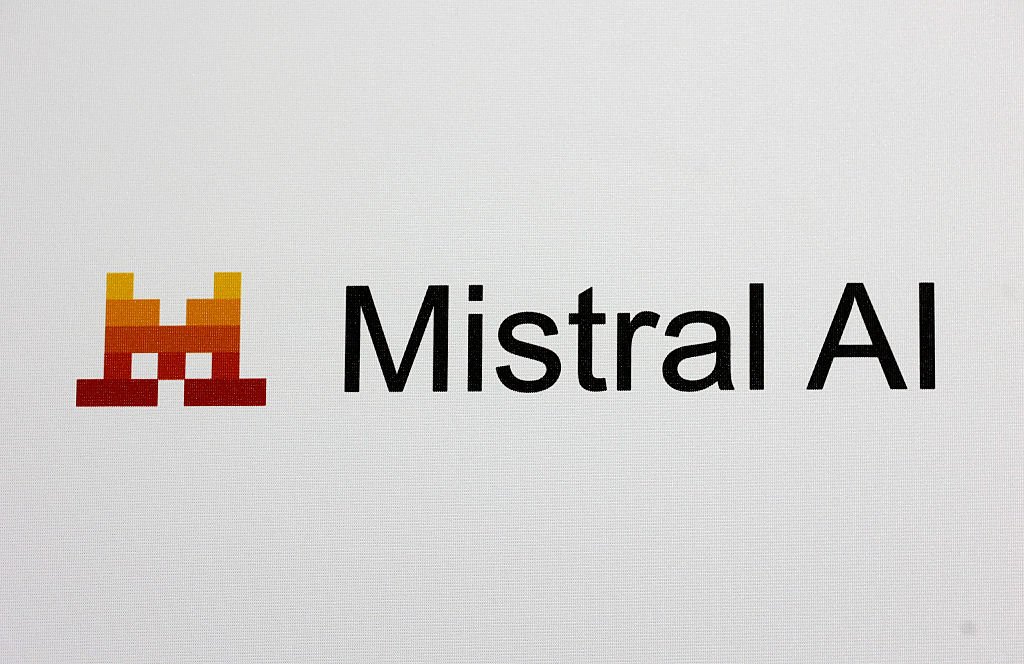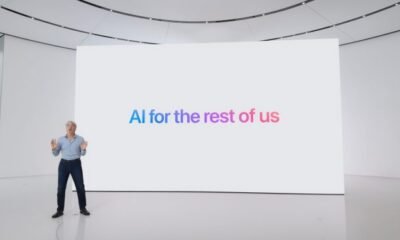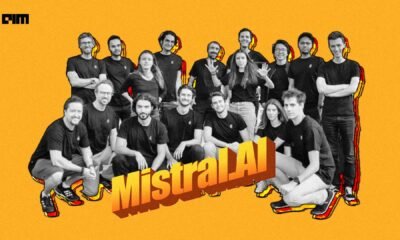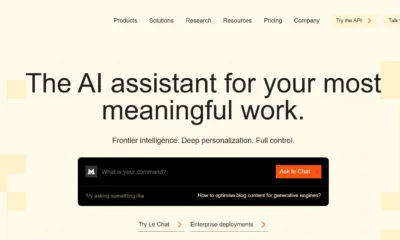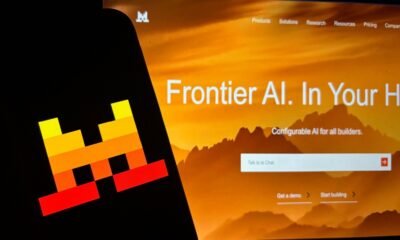Mistral AI, the French company behind AI assistant Le Chat and several foundational models, is officially regarded as one of France’s most promising tech startups and is arguably the only European company that could compete with OpenAI.
It is reportedly in the process of raising another round that would value it at $14 billion, up from about $6 billion in June, 2024. While Mistral AI describes itself as “the world’s greenest and leading independent AI lab” it is still not as well known as its biggest competitors.
“Go and download Le Chat, which is made by Mistral, rather than ChatGPT by OpenAI — or something else,” French president Emmanuel Macron said in a TV interview ahead of the AI Action Summit in Paris in February 2025.
What is Mistral AI?
Mistral AI, which offers open-source AI models, has raised significant amounts of funding since its creation in 2023 with the ambition to “put frontier AI in the hands of everyone.” While this isn’t a direct jab at OpenAI, the slogan is meant to highlight the company’s openness versus OpenAI’s typically closed approach.
Its alternative to ChatGPT, chat assistant Le Chat, is available on iOS and Android. It reached 1 million downloads in the two weeks following its mobile release, even grabbing France’s top spot for free downloads on the iOS App Store.
In July 2025, Mistral AI updated Le Chat with new features that bring it closer to rival full-stack AI chatbots: a new “deep research” mode, native multilingual reasoning, and advanced image editing. This update also includes the addition of Projects, which lets users group chats, documents, and ideas into focused spaces.
As of September 2025, Le Chat also has the ability to remember previous conversations with the introduction of Memories.
Techcrunch event
San Francisco
|
October 27-29, 2025
This comes in addition to Mistral AI’s suite of models, which includes:
- Mistral Large 2, the primary large language model replacing Mistral Large.
- Pixtral Large, unveiled in 2024 as a new addition to the Pixtral family of multimodal models.
- Magistral, its first family of reasoning models, launched in June 2025.
- Mistral Medium 3, released in May 2025 with the promise of providing efficiency without compromising performance, and best for coding and STEM tasks.
- Voxtral, Mistral’s first open source AI audio model, released in July 2025.
- Devstral, an AI model designed for coding and openly available under an Apache 2.0 license, meaning it can be used commercially without restriction.
- Codestral, an earlier generative AI model for code, but whose license banned commercial applications.
- “Les Ministraux,” a family of models optimized for edge devices such as phones.
- Mistral Saba, focused on Arabic language.
In March 2025, the company introduced Mistral OCR, an optical character recognition (OCR) API that can turn any PDF into a text file to make it easier for AI models to ingest.
In June 2025, Mistral AI also released a vibe coding client, Mistral Code, to compete with incumbents like Windsurf, Anysphere’s Cursor, and GitHub Copilot.
Who are Mistral AI’s founders?
Mistral AI’s three founders share a background in AI research at major U.S. tech companies with significant operations in Paris. CEO Arthur Mensch used to work at Google’s DeepMind, while CTO Timothée Lacroix and chief scientist officer Guillaume Lample are former Meta staffers.
Co-founding advisers also include Jean-Charles Samuelian-Werve (also a board member) and Charles Gorintin from health insurance startup Alan, as well as former digital minister Cédric O, which has caused persistent controversy due to his previous role.
Are Mistral AI’s models open source?
Not all of them. Mistral AI differentiates its premier models, whose weights are not available for commercial purposes, from its free models, for which it provides weight access under the Apache 2.0 license.
Free models include research models such as Mistral NeMo, which was built in collaboration with Nvidia that the startup open sourced in July 2024.
How does Mistral AI make money?
While many of Mistral AI’s offerings are free or now have free tiers, Le Chat also has paid tiers. Introduced in February 2025, Le Chat’s Pro plan is priced at $14.99 a month.
On the purely B2B side, Mistral AI monetizes its premier models through APIs with usage-based pricing. Enterprises can also license these models, and the company likely also generates a significant share of its revenue from its strategic partnerships, some of which it highlighted during the Paris AI Summit.
Overall, however, Mistral AI’s revenue is reportedly still in the eight-digit range, according to multiple sources.
What partnerships has Mistral AI closed?
In 2024, Mistral AI entered a deal with Microsoft that included a strategic partnership for distributing its AI models through Microsoft’s Azure platform and a €15 million investment. The U.K.’s Competition and Markets Authority (CMA) swiftly concluded that the deal didn’t qualify for investigation due to its small size. However, it also sparked some criticism in the EU.
In January 2025, Mistral AI signed a deal with press agency Agence France-Presse (AFP) to let Chat query the AFP’s entire text archive dating back to 1983.
Mistral AI also secured strategic partnerships with France’s army and job agency, Luxembourg, shipping giant CMA, German defense tech startup Helsing, IBM, Orange, and Stellantis.
In May 2025, Mistral AI announced it would participate in the creation of an AI Campus in the Paris region, as part of a joint venture with UAE-investment firm MGX, NVIDIA, and France’s state-owned investment bank Bpifrance.
In June 2025, it was announced that beginning in 2026, Mistral will launch a European platform dedicated to AI and powered by Nvidia processors, Mistral Compute. The initative was hailed as ‘historic’ by Macron, who shared the stage with Mensch and Nvidia CEO Jensen Huang at the VivaTech conference shortly after the announcement.
In July 2025, it announced AI for Citizens, “a collaborative initiative to help States and public institutions strategically harness AI for their people by transforming public services, catalyzing innovation, and ensuring competitiveness.”
What enterprise features has Mistral AI developed?
In May 2025, Mistral AI released the Mistral Agents API to “empower enterprises to use AI in more practical and impactful ways,” according to its Head of Developer Relations, Sophia Yang.
In September 2025, the company unveiled a revamped Connectors directory, showcasing Le Chat’s integrations with some 20 enterprise tools including Asana, Atlassian, Box, Google Drive, Notion, Zapier, as well as emails and calendars; and soon, Databricks and Snowflake.
How much funding has Mistral AI raised to date?
As of February 2025, Mistral AI raised around €1 billion in capital to date, approximately $1.04 billion at the current exchange rate. This includes some debt financing, as well as several equity financing rounds raised in close succession.
In June 2023, and before it even released its first models, Mistral AI raised a record $112 million seed round led by Lightspeed Venture Partners. Sources at the time said the seed round — Europe’s largest ever — valued the then-one-month-old startup at $260 million.
Other investors in this seed round included Bpifrance, Eric Schmidt, Exor Ventures, First Minute Capital, Headline, JCDecaux Holding, La Famiglia, LocalGlobe, Motier Ventures, Rodolphe Saadé, Sofina, and Xavier Niel.
Only six months later, it closed a Series A of €385 million ($415 million at the time), at a reported valuation of $2 billion. The round was led by Andreessen Horowitz (a16z), with participation from existing backer Lightspeed, as well as BNP Paribas, CMA-CGM, Conviction, Elad Gil, General Catalyst, and Salesforce.
The $16.3 million convertible investment that Microsoft made in Mistral AI as part of their partnership announced in February 2024 was presented as a Series A extension, implying an unchanged valuation.
In June 2024, Mistral AI then raised €600 million in a mix of equity and debt (around $640 million at the exchange rate at the time). The long-rumored round was led by General Catalyst at a $6 billion valuation, with notable investors, including Cisco, IBM, Nvidia, Samsung Venture Investment Corporation, and others.
According to Bloomberg, Mistral AI is now finalizing a €2 billion investment at a post-money valuation of $14 billion. This follows earlier reports that the company was in talks to raise $1 billion in equity from investors including Abu Dhabi’s MGX fund, as well as hundreds of millions of euros in debt. But
How is Mistral AI approaching AI regulation?
Mensch was part of a group of European CEOs who signed an open letter in July 2025 urging Brussels to ‘stop the clock’ for two years before key obligations of the EU Artificial Intelligence Act enter into force. The European Commision is sticking to its original timeline.
What could a Mistral AI exit look like?
Mistral is “not for sale,” Mensch said in January 2025 at the World Economic Forum in Davos. “Of course, [an IPO is] the plan.”
This makes sense, given how much the startup has raised so far: Even a large sale may not provide high enough multiples for its investors, not to mention sovereignty concerns depending on the acquirer.
However, the only way to definitely squash persistent acquisition rumors — lately naming Apple — is to scale its revenue to levels that could even remotely justify its valuation. Either way, stay tuned.
This story was originally published on February 28, 2025 and will be regularly updated.

